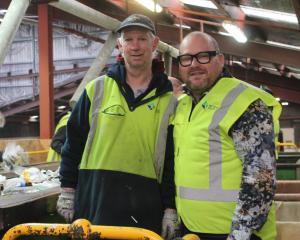New Zealand High Commissioner to India Rupert Holborow yesterday said the country wanted to improve agricultural production to meet the needs of a growing population.
The first agricultural revolution staved off starvation after India's independence from Britain in 1947.
Since then, production had started to plateau even as demand increased.
About 80% of the country's water resources were already used for agriculture, making the challenge to transform the country's dry lands into productive land even more difficult.
New Zealand businesses were already helping improve production on a modest scale, with some supplying fruit-grading systems and potato harvesters, but it was time to think bigger.
"There is a real need for India to find ways to improve its performance, and where better to look than New Zealand, where our agribusiness models and experience is second to none," Mr Holborow said.
"There should be room to move ... more into that sphere."
Mr Holborow was in Dunedin yesterday to talk about establishing business links with India, at a meeting of business leaders at the Otago Chamber of Commerce.
In an interview, he said preliminary discussions about a free-trade agreement between the countries had already raised New Zealand's profile as a trade, investment and business partner.
New Zealand businesses hoped an agreement would break down the barriers created by high tariffs, which particularly affected value-added products.
Meanwhile, Indian businesses were increasingly aware that investment tended to follow trade and that a benign, free-trade environment could generate new support from New Zealand.
New Zealand Trade and Enterprise was already helping about 40 businesses move into India.
Many of them were focused on value-added, service or knowledge-based industries.
Other companies were already applying what they had learned in the New Zealand market to India.
Dunedin-based company Crest Commercial Cleaning's successful Mumbai franchise showed how well strong business models could work even in a competitive, low-wage economy.
The time was right for New Zealand businesses to update their thinking on, and relationship with, India.
"We must think of a country that sells 12 million to 15 million cellphones a month; a country that has a company, Tata, that owns Jaguar and Land Rover. Think of a country whose economy adds to itself each year growth the size of the economy of Vietnam," Mr Holborow said.
"In my view, this is an economy whose size will overtake the United Kingdom in the next decade, and will be bigger than Japan within 20 years.
In 2030, it is not unreasonable to expect it to be the third-largest in the world.
"With such growth and possibility, there is a need for New Zealanders to look more seriously at their relationship with India, and to engage more closely as these significant changes take place."












